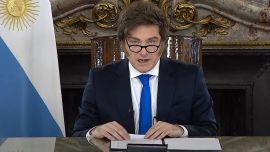Argentina's debt restructuring talks with the International Monetary Fund are entering a crucial phase, with the nation facing payments worth more than US$1 billion in the next two weeks.
President Alberto Fernández's government is currently seeking to renegotiate the terms of a record US$57-billion stand-by loan agreed in 2018. To date, Argentina has received US$44 billion of the credit-line, after having refused the remaining US$13 billion.
Under the terms of the 2018 deal – agreed by Fernández's predecessor in office, Mauricio Macri – Argentina must make a payment on the principal of US$731 this Friday, January 28. A few days later, on February 1, it also faces an additional interest payment on the loan worth US$386 million, a figure the government hopes to lower with its push against IMF surcharges.
The government is seeking a new financing agreement with the Fund that will reduce Argentina's fiscal deficit through growth, not by cutting public spending. President Fernández has vowed not to adopt "austerity" measures as part of any deal.
Latin America's third-largest economy has been in recession since 2018 and is seeking to renegotiate its current plan, with amounts of US$19 billion and US$20 billion due in 2022 and 2023.
The country registered GDP growth of 10 percent in 2021 after a drop of 9.9 percent the previous year largely due to the coronavirus pandemic.
Talks between the government and the multilateral lender are currently stalled, with differences over the size of the fiscal deficit in the coming years the main source of disagreement.
As yet, the Casa Rosada has refused to confirm whether the payments in the next two weeks will be made, preferring to keep its powder dry. However, Economy Minister Martín Guzmán, in an interview with the AFP news agency last week, said the repayment calendar was "unsustainable" for a country battling a poverty rate of some 40 percent and one of the highest inflation rates in the world at 50 percent.
He said that Argentina “needs more time to pay and wants to reach an agreement, which is necessary for both parties".
“There is nearly agreement on where to converge,” said Guzmán. “The difference lies in the speed [of repayment] and this has to do with differing objectives.”
With talks currently blocked, Argentina faces difficulties in making the upcoming repayments. The Central Bank's net reserves are at their lowest level since 2016: last Friday, they were lower than US$39 billion. Most analysts estimate that liquid reserves are below US$4 billion, a scenario that makes it almost impossible to meet the upcoming repayments, with an additional US$2.9 billion due in March.
Since he took office, Alberto Fernández has paid the IMF a total of U$S 6,359 million, for the record loan of 2018.
Speaking at an event on Monday, President Fernández again tried to pressure the Fund over negotiations, saying that Argentina had "the right to grow as we want to grow."
We "cannot repeat histories in economic matters," added the Peronist leader, who warned that "when austerity came, our people suffered."
Economist Daniel Marx on Monday cast doubt over Argentina's availability to meet its obligations.
"This week, you have to pay the Fund US$720 million. Then there is another maturity in a month that is just over US$300 million and in March there is a larger maturity, which is approximately US$2.9 billion," he said in an interview with a local radio station.
He observed that around US$29 billion of Central Bank reserves correspond to a currently swap with China's Central Bank, which means they will not be able to be used for repayments.
"There are almost US$2 billion that correspond to the liquidity of the banks backing dollar deposits," said Marx, adding: "If one were to reduce the amounts to gross reserves, one is left with around zero."
– TIMES/NA/AFP


























Comments